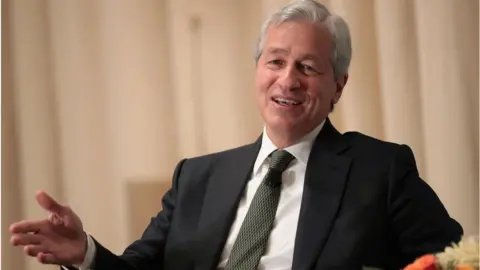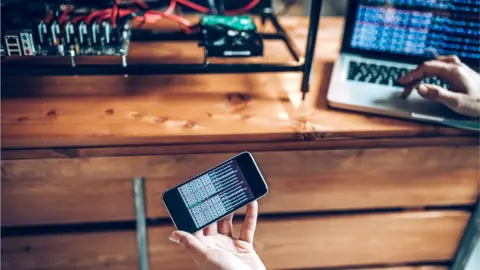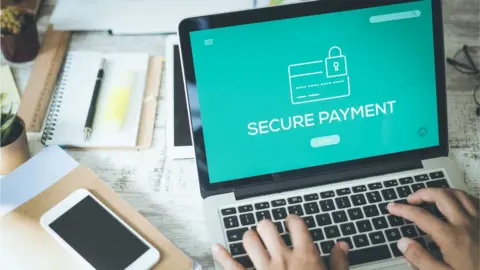JP Morgan creates first US bank-backed crypto-currency
 Getty Images
Getty ImagesUS investment bank JP Morgan has created a crypto-currency to help settle payments between clients in its wholesale payments business.
JPM Coin is the first digital currency to be backed by a major US bank.
The crypto-currency, which runs on blockchain technology, has been used successfully to move money between the bank and a client account.
JP Morgan says it sees potential in using digital coins to reduce risk and enable instant transfers.
Although JP Morgan's chief executive Jamie Dimon has publicly criticised Bitcoin - the first crypto-currency in existence - on several occasions, the bank says it has always "believed in the potential of blockchain technology".
"We are supportive of crypto-currencies as long as they are properly controlled and regulated," Umar Farooq, JP Morgan's head of Digital Treasury Services and Blockchain, wrote in an online Q&A page.
How do crypto-currencies work?
Virtual currencies can be used to pay for things in the real world, such as a hotel room, food or even a house.
Digital tokens are held in online wallets, and can be sent anonymously between users.
For this reason, crypto-currencies are attractive to people who want to make illegal purchases on the Dark Web - a part of the internet that is not indexed by search engines.
What is blockchain?
A blockchain is a ledger of blocks of information, such as transactions or agreements, that are stored across a network of computers.
This information is stored chronologically, can be viewed by a community of users, and is not usually managed by a central authority such as a bank or a government.
The concept was designed to ensure security and anonymity for users, by preventing tampering or hijacking of the network.
 Getty Images
Getty ImagesOnce published, the information in a certain block can't be changed. If people try to tamper with that information, it becomes obvious.
This is a powerful concept. Ten years ago, blockchain was combined with other technologies to create cryptocurrencies, and the first blockchain-based cryptocurrency was Bitcoin.
Can anyone use JPM Coin?
No. JPM Coin is not for retail customers - it will be used internally by JP Morgan to enable the instantaneous transfer of payments between institutional accounts.
When a JP Morgan client deposits money into an account, the money is converted into an equivalent number of JPM Coins, so $1m equals one million JPM coins.
The client can then use the coins to perform transactions over the bank's blockchain network Quorum with other clients, for example money movement or payments in securities transactions.
Once the transactions have been performed, holders of JPM Coins can redeem them for US dollars from the bank.
Does JP Morgan really need this?
Not everyone is convinced that JP Morgan needed to create its own digital currency.
A blockchain is designed to be decentralised, so no one party has control over transactions being sent over the network.
This is the opposite of the JPM Coin concept.
"It doesn't even need a blockchain at all because JP Morgan runs it. They could do it on a website and database they run," David Gerard, author of Attack of the 50 Foot Blockchain: Bitcoin, Blockchain, Ethereum & Smart Contracts, told the BBC.
"It isn't like Bitcoin that aren't under anybody's control - it's a centrally controlled thing that sounds vaguely like crypto-currency."
JP Morgan says that it is trialling crypto-currency and blockchain in order to speed up payment transfers, as well as reducing clients' counterparty and settlement risk, and decreasing capital requirements.
However, Mr Gerard is sceptical and does not believe that the bank needs the technology to speed up transactions.
What about regulators?
JP Morgan's Umar Farooq told the BBC that JP Morgan is using blockchain because of the improvements in speeds and security that the technology offers.
Because of the privacy that blockchain enables, the bank envisions having a network whereby clients, such as large banks, can move coins between themselves on the network, and JP Morgan does not see these transactions.
 Getty Images
Getty ImagesHowever, the bank stressed that all information required by regulators will continue to be tracked.
Clients will only be able to use the blockchain network if they have been approved by regulators and have passed money laundering checks.
"There is a possibility in the future of a blockchain that is private, except from the regulator," said Mr Farooq.
"There are various ways to make the regulatory regimes across the world stronger over time."